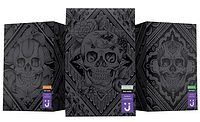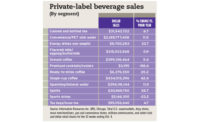Category Focus
Milk, bulk still water top in private-label sales
Value, quality drive private label acceptance

With nearly 50% of market share, refrigerated private-label dairy products had dollar sales of $7.3 billion, slightly less than the $7.9 billion notched for national brands, IRI data states.
Images courtesy of Wal-Mart
Quoted for hundreds of years, “A penny saved is a penny earned” is a popular idiom attributed to Founding Father Benjamin Franklin. When it comes to currency, Franklin’s face graces the $100 bill, while Abraham Lincoln, the 16th president, has been on the penny since 1909. Cash-strapped consumers looking to save a little dough often turn to private label offerings, which saw pandemic-driven increases in consumer perception and sales across many consumer packaged goods (CPG) categories.
In its “Private Label Food and Drink – US, 2021” report, Chicago-based Mintel notes that the private label food and drink industry saw a surge in sales during the COVID-19 pandemic, alongside overall elevated sales in the food and drink retail market.
“In 2020, the market grew by 14% to reach $98 billion,” the report states. “However, while the change in lifestyle and day-to-day shopping may have changed during the pandemic, sales figures may subside as the pandemic ends and people return to normal shopping habits.”
Although brand name still is an influential purchase factor in many beverage categories, including beer, wine, spirits and premixed cocktails/coolers — which have very low private-label market share topping out at 0.3% — it could be becoming less about a “well-known” brand, and more about a “well-aligned” brand that stands out for meeting consumers’ current need states and priorities, such as social re-emergence, health and ethics, the report adds.
PHOTO CREDITS
In its October “Private Label Beverages & Contract Packaging in the U.S.” report, New York-based Beverage Marketing Corporation (BMC), notes that private label is a large and growing business in the United States. “Sales reached $158.8 billion in 2020, up from $142.3 billion in 2019,” the report states.
Although many view private label as a disparate grouping of product categories represented by a range of retailers, private label actually resembles many industries including beverages, personal care, household cleaners, paper goods, soups, cheese and more.
In November, the nonprofit Private Label Manufacturers Association (PLMA), the trade association representing the $200 billion U.S. store brand industry, announced that its 4,500 member companies in more than 75 countries now have access to near real-time customized market data from Information Resources Inc. (IRI), Chicago.
Backed by the PLMA, virtually all CPG categories contain some elements of private label except the very newest or smallest categories.
“Further, most consumers view private label products as brands, according to the PLMA, with similar qualities and characteristics of national brands,” BMC’s report states. “Private label growth has mostly increased annually in the low single-digits since spiking during the recession and then again in 2020 due to the pandemic.
“Retail sales of all private-label products were up by 11.6% in 2020. Since 2007, private label retail sales have more than doubled,” it continues. “… Overall, private label performs better in a weaker economy as consumers seek out the best possible value. Research conducted for the PLMA suggests that shoppers are likely to stay with private label products even after the economy improves, but national brand marketers may beg to differ with that analysis.”

Image courtesy of ALDI
Dairy, the darling of private label
When reviewing private label performance across myriad beverage categories, there is little question about which category stands out. Mary Ellen Lynch, principal for IRI, notes that the presence of private label is most prevalent in the refrigerated “milks” aisle where private-label dairy milks, including plant-based nut milks, comprise 50% of dollar sales and are the undisputed “category captain” of the dairy case.
“Milk is a commodity that is an anomaly when talking about private label. Private label is 50% of milks department; yet, private label is only a modest share of 3.7% of total beverage sales excluding milk,” Lynch explains. “Private label beverages overall did not perform as well as national brands. Total private label beverages, excluding milks, experienced slight dollar sales decline of minus 0.8% versus a year ago compared to national brands, which grew 5.9%. Though growth was a challenge this past year, private label beverage [excluding milk and still waters] actually grew 7.6% versus two years ago.”
In total U.S. multi-outlets for the 52 weeks ending Oct. 3, milk had the lion’s share of the private-label category with 49.3% market share and dollar sales of $7.3 billion, a little less than half of the $15.3 billion for national ($7.9 million) and private-label brands. Jug/bulk still water, at No. 2 with 44.8% market share, had $755 million in dollar sales vs. $900 million for national brands. With 25.8% market share, private-label convenience/PET still water notched dollar sales of $3.1 billion while its name brand counterparts generated $9.6 billion in sales, IRI data states.
Other private-label beverage categories performing well were drink mixes, which at 5.9% grew at twice the rate of national brands (2.3%); refrigerated juices and drinks grew 9.9%, more than doubling the national brands at 4.4%; and shelf-stable, ready-to-drink (RTD) tea and coffee grew 19%, almost twice the rate of national brands (9.3%), Lynch says.
“This growth is driven primarily by the iced/cappuccino RTD coffee,” Lynch says. “These drinks are a break from the consumers’ everyday cup of coffee and with their sweeter and creamer taste profiles align with consumers craving for indulgence.”
Up 42.9% in dollar sales, private label, non-aseptic sports drinks is outpacing national brands at 17.1% with dollar sales of $44 million versus $8.7 billion for national brands, Lynch adds.
Conservative spending
Experts note that private label’s success varies wildly by category and by retailer. Most large retail chains like Kroger, Wal-Mart or Whole Foods have sophisticated private label programs. For instance, Kroger’s private label program now accounts for nearly a third of all its sales, according to BMC’s report.
Private label itself has close to 100% household penetration, with three-quarters of all baskets containing some private-label products, according to John Owen, associate director in the food and drink sector at Mintel.
“Grocery retailers continue to invest in their product portfolios and see them not just as a way to cater to price-conscious shoppers but also as an opportunity to leverage and strengthen their own brand equity,” Owen says. “For their part, shoppers are more open than ever to store private label food and drink products but are also more demanding.”
Private label food and drink products were making slow but steady gains before the pandemic and have the potential to do so long after, he adds.
IRI’s Lynch agrees: “Success is dependent on how well the retailers in that channel understand the beverage needs of their shopper. It is less about private label and more about meeting the consumer where they are, with the right assortment of products, including private label products designed to resonate with the retailers’ strategic shopper targets.”
Experts note that the biggest obstacles to private label growth are the sophisticated marketing campaigns and aspirational positioning of national brands that have a strong influence on consumer behavior.
Yet, private-label beverages could benefit from consumers’ experience with beverages on-premise, outside of grocery retailers also will influence their choice.
Jeff Lenard, vice president for strategic industry initiatives at Alexandria, Va.-based NACS, surmises that the benefits related to private label have traditionally been related to offering a product that is not available at competing stores and offering it at a very competitive price.
“[T]hose are certainly still true,” Lenard says. “But the recent supply disruptions may also have presented another benefit if retailers are able to minimize out of stocks with their private label offers.”
Thrifty is nifty
In times of financial hardship, consumers might purchase more private-label products to cut back on spending as witnessed during the economic downturn of 2008-2009. The pandemic also put private label back in the spotlight, states Chicago-based Euromonitor International’s “Global Trends and Corporate Strategies in Private Label” report.
“Improved product quality will keep private label sales high,” Euromonitor’s report states. “Although private label goods have historically competed primarily on price, the quality of these products is now comparable with name brand analogues in many cases. As a result, a significant share of consumers now purchasing store brands for the first time will continue to use these private label goods.”
IRI’s Lynch notes there are “definite pockets of opportunity” for private-label beverages, especially for more premium or added benefit products at a good price. “Retailers will continue to invest in leveraging their store brands to differentiate themselves,” she explains. “This may be accomplished through unique (but approachable) flavors, different formats, functional benefits, packaging and sizes — or even possibly included with their in-store grab-and-go meal solutions.”
In a Sept. 2, 2021, blog post, Jonny Forsyth, associate director for food and drink at Mintel, denotes the importance of boosting investment in private label drinks.
“In more mature private label markets, retailers have much to gain by investing in their private label drinks ranges,” he wrote. “There is clear consumer demand for private label drinks that are premium and innovative at a reasonable price, rather than cheap imitators of brands. Better-quality drinks ranges cannot only generate healthier profits for retailers, but also help to deepen loyalty and attract new customers.”
Looking for a reprint of this article?
From high-res PDFs to custom plaques, order your copy today!






